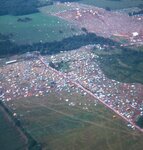BETHEL — Since the beginning of the oral history initiative in 2020, The Museum at Bethel Woods has been committed to collecting and preserving stories from the people who know Woodstock best. …
This item is available in full to subscribers.
Please log in to continue |


BETHEL — Since the beginning of the oral history initiative in 2020, The Museum at Bethel Woods has been committed to collecting and preserving stories from the people who know Woodstock best. In 2022, the Museum was awarded a grant from the Institute of Museum and Library Services to take this initiative to the next level, to pay for curators and community connectors to travel the country and record their Woodstock tales.
Below is part 2 on the project’s progress with Senior Curator Neal Hitch as he and fellow curator Julia Fell continue to collect data and stories.
Who are you missing?
There are African Americans at Woodstock. They’re in the pictures, you see them everywhere, that’s been a community that we have not reached like I wish we would have. The grant allowed us to use community connectors to reach people but we didn’t have the success we thought we’d have. People in communes don’t want to talk to a big institution. If you’re cold calling someone and say you’re from a museum and we’d like to talk to you about your life story on activism and being anti-government most of your life, people tend to not answer or return that phone call.
What happens with all this? At what point do you say that’s enough?
How do we decide what’s enough? Someone shows up at the museum and says, ‘I was at Woodstock’ and we’ll say, ‘Do you want to do an oral history?’ and they’ll say, ‘Nah’ and I think, but your story will be gone. There will be a day when your grandchildren bring their grandchildren to this museum to hear your story. Is it going to be here? You’re making a choice. This is a hard thing. We are at the very beginning of the creation of getting the stories. Eventually, we’ll have to build an archival program, determine keywords, and build metadata within this. So when you say camping or type that into your computer you’ll pull up hundreds of stories people have about camping at Woodstock. You’ll have the typed manuscript, audio and video.
Is it tough for people who want to see their videos right away.
It is tough. I wish that was possible. Someone says, ‘Let me know when I can come in and hear this.’ Will we have this accessible in their lifetime? I don’t know. If you came today, and said I did my oral history with you in 2022 and I’d like my grandchild to see it, we can find that and you can see it on the computer. It’s not like the information isn’t here. It’s just not in a format you would think it should be. We are building an archive, but it will be years before the archive is accessible.
Do you see a day when you’re done?
Yeah, I don’t know. When you say it, that seems very harsh. Making me a little emotional to say, am I going to be the person who says that? We have meetings right now, what does 2025 look like?
You’ve said there’s a lack of local stories?
When you’re in and around Sullivan County, almost everywhere you go someone will say, ‘I remember when I was a child my mom made peanut butter sandwiches and we stood on the sidewalk and passed food out.’ People tell you that all over. But none of that is recorded for history, here in this collection. I think in 2025 we’ll make a big effort to collect local stories. I think they tell a side of the story, why Woodstock worked, why it was three days of peace. Because the community stepped up and cared for people. That’s important. It would be very sad to me if we finished this project and someone came here on the 100th anniversary and the local stories weren’t here.
What do you hope people get out of the project?
Peace wasn’t an accident. Peace was planned. This group of people put together a plan to create a festival that would be three days of peace and music. When they hit the worst possible circumstances with more people, traffic, rain and not getting food into the venue…when all the parts of the plan fell apart, the plan for peace didn’t fall apart. The plan for peace worked. That wasn’t an accident.
The last question we ask in all of our interviews is, ‘What does the legacy mean to you, of these three days?’ and a surprising number of people say, ‘That what I experienced was peace. I know peace is possible and I have hope that people can live in peace.’
Comments
No comments on this item Please log in to comment by clicking here